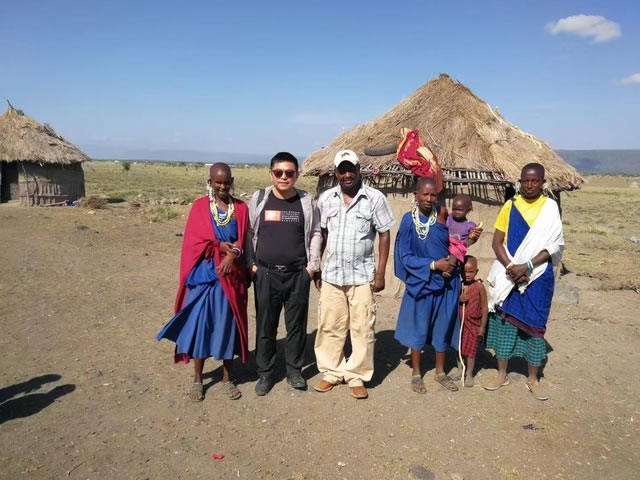| Ebola Fighters Created by NUA Won the 33rd Flying Apsaras Award |
On the evening of November 1st, the 33rd Flying Apsaras Award ceremony hosted by the National Radio and Television Administration was held in Beijing. Ebola Fighters, which is written by Professor Li Xiangmin (pseudonym Nan Ke), the vice president of Nanjing University of the Arts (NUA) and the head of the national first-class undergraduate major construction site of Theatre Film and TV Literature, and produced by Tencent Video, won the Excellent TV Series Award. This is an important achievement of our university’s drama and film creation and disciplinary construction.
Flying Apsaras Award, is a “government award” for TV dramas hosted by National Radio and Television Administration.
As one of the four important dramas created under the direct guidance of the National Radio and Television Administration to celebrate the 100th Anniversary of the Chinese Communist Party, Ebola Fighters takes the story about how the Chinese medical team fought against the Ebola virus in 2014 as the prototype. It depicts the story of how the virologist Zheng Shupeng and his teammates fighting against the virus in Africa. As the deputy director of the National Radio and Television Administration Zhu Yonglei said, Ebola Fighters is based on a major event of the party and the country, and the great practice and creation of the people. It reflects the changes of the times, the progress of China, and the call of the people. It has completed an exploration with both patriotism and international vision.” The creation of Ebola Fighters began on the New Year's Day in 2018. After solid research and multiple in-depth interviews, Li Xiangmin firstly completed the story framework. In order to gain a deep understanding of the actual situation of fighting against the Ebola virus, Li Xiangmin and his team went to Africa to conduct a field interview, and gained a lot of real and vivid detailed stories.
In Tanzania, Li Xiangmin saw a young man from Jiangsu in his 20s buried in the Chinese expert cemetery. He learned that in order to assist Tanzania’s national construction, 69 Chinese experts and technicians died in the line of duty and never returned home. Li Xiangmin visited the local village by himself and saw that the villagers were cooking and eating bananas. The only furniture in the house was an iron wire for hanging clothes. The bed was made of dirt, and the stove was made of three bricks. Although they were living in a poor condition, people in the country had a strong feeling towards China. The local citizens watched the Chinese TV series Beautiful Daughter-in-law. Li Xiangmin was injured in an accident during his visit in Africa. He also experienced the local medical treatment and got in touch with the work of the Chinese medical team.
In Li Xiangmin's view, in addition to letting the audience know more about the viciousness of the virus and the tenacity and persistence of medical staff and experts when facing the “war”, Ebola Fighters should also show the grand theme of a human community with a shared future. When facing such a virulent virus like Ebola, no one or any country can stand alone, We are not only helping Africa, but also helping ourselves.” During this process, there is a word that transcends aid, that is, mutual aid. While our country is providing aid for Africa, the African people are also providing aid for us. The aid from both sides is sincere and mutual. Li Xiangmin believes that real historical figures and events are more moving. During his creation, he interviewed several batches of medical teams from China that went to Africa to fight against Ebola, and visited many rural families in Africa. He learned about many real and touching stories, and finally managed to have a panoramic view about this event. Ebola Fighters pays homage to the benevolence of doctors, depicts the love without boundaries, and demonstrates our country's responsibility as a major country under a human community of shared future. According to incomplete statistics, Ebola Fighters was broadcast on the top network platforms, Beijing Radio and Television Network (BRTV), and Zhejiang Satellite TV (ZJSTV). When it was broadcast, this TV series attracted over 190 million audience and has led the national audience rating. It has also achieved the first ranking in ZJSTV for many times. Relevant topics have appeared on the trending topics of many platforms, such as Weibo, Douyin, and Kuaishou. It has broken the audience's stereotypes of medical dramas and main theme dramas, and aroused audiences' expectations and recognition for high-quality domestic dramas with positive energy.
As the leader of the national first-class undergraduate major construction site of Theatre Film and TV Literature, Li Xiangmin believes that writers and artists must firmly remember the four consciousnesses in their creation, confirm that the themes of their works must conform to the correct political orientation, to the socialist core values, and to the emotional needs of a harmonious society. This TV series allows the audience to feel the African people's love for their homeland, as well as their unique view of life, culture and values. As Ambassador Xu Jinghu, the Special Representative of the Chinese Government on African Affairs, said: Ebola Fighters is well-selected and well-conceived, showing China's responsibility as a major country. It is diverse, colourful, and vivid, with life-like characters shaped in flesh and blood. It not only conveys positive energy but also resonate with the audience during the pandemic.” The creation of Ebola Fighters has also made a positive response to the Belt and Road Initiative. In the future, Nanjing University of the Arts will continue to keep in mind the mission of the times, strengthen the determination to prosper and develop the cultural industry and literary and artistic industry in the new era, adhere to creating high-quality cultural and artistic projects, enhance the dissemination of Chinese culture, and improve the social influence and public opinion guidance of cultural and art colleges and universities through literary and artistic works with a high standard, a sophistic view, and a caring heart.
|
- Copyright
- All text, images, and audio and video manuscripts on this website are only for display on the English official website of Nanjing University of the Arts and are not used for any commercial purposes. The copyright of the works belongs to the authors of each work. No media, website, unit, or individual may download, reprint, link, repost, or reproduce and publish without the written authorization of the school and the author. Otherwise, Nanjing University of the Arts will hold them legally responsible for the behavior.





